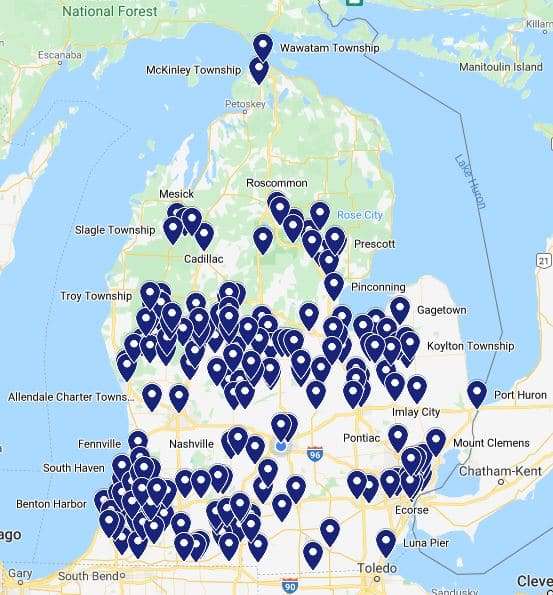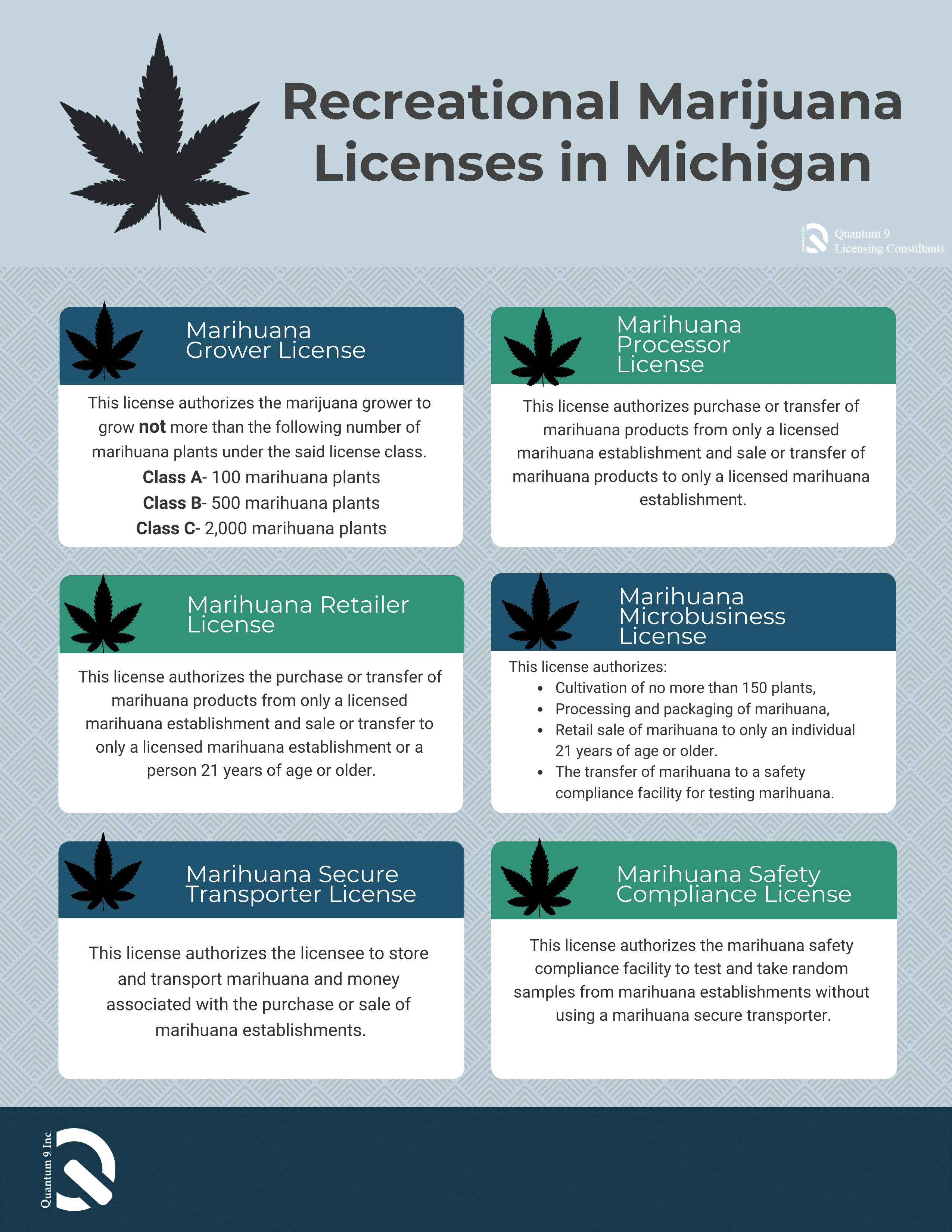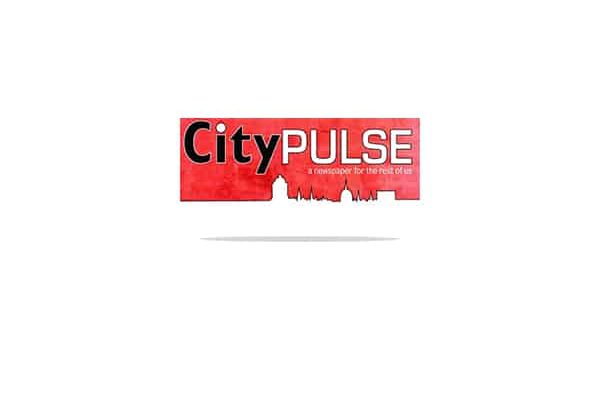Would you like to become a cannabis business owner in Michigan? Legal marijuana sales in Michigan are predicted to reach over $2 billion in 2022. Make the application process simple and let our Michigan marijuana license consulting services help you win a license.
Below, our Michigan cannabis consulting firm summarizes the license application process, followed by a step-by-step guide on how to win a cannabis business license.
Laws and Regulations for Michigan’s Adult-Use Cannabis Industry
First of all, to win a marijuana business license in Michigan, you must first read its cannabis acts, laws and regulations. Doing so will help you understand the types of licenses available, the application process and operational requirements:
- Medical Marihuana Act (MMMA)
- Medical Marihuana Facilities Licensing Act (MMFLA) and associated administrative rules
- Michigan Regulation and Taxation of Marihuana Act (MRTMA).
The Marijuana Regulatory Agency (MRA) is a Bureau within the Michigan Department of Licensing and Regulatory Affairs (LARA). It licenses and regulates Michigan cannabis businesses.
To become a successful marijuana business owner, we suggest that you regularly visit the MRA website for the latest updates.

Marquette, Michigan
Types of Adult-Use Cannabis Business Licenses in Michigan
Fortunately, Michigan offers a wide variety of business license types for prospective marijuana business owners. Under the MRTMA, you can apply for the following:
- Grower License
- Processor License
- Retailer License
- Microbusiness License
- Secure Transporter License
- Safety Compliance Facility License
The application requirements for each are very specific to their operations. For example, a marijuana grower license application requires different operation plans in comparison to a processor license.
Since each license varies in its rules and requirements, feel free to contact our Michigan marijuana license consulting firm. We can help you choose the right business type for you.
Below, this infographic details the recreational licenses available in Michigan.
Next, we’ll discuss Michigan marijuana business application timelines and eligibility to apply.
Timeline for Michigan Cannabis Business License Applications
Michigan is accepting state applications on a rolling basis for both new and existing marijuana facilities.
Simply put, the application period is open and there is no limit to the number of state licenses.
Eligibility and Qualifications
Before we discuss the application process, let’s review the eligibility and qualifications required to receive a license.
First, eligibility for Michigan marijuana licenses is more about what might make you ineligible!
Keep in mind that Michigan emphasizes social equity to empower its disproportionately impacted communities. As a result, convicted felons can apply for a license and/or be supplemental applicants for a marijuana business license.
To see how this works, read Rules 2, 4, and 12:
- Rules 2 and 4 in the Marihuana Licenses Rule Set detail the application requirements, qualifications and ineligibility for state licensure.
- Rule 12 outlines reasons for denial of a state license.
And, the only immediate disqualifying conviction is one involving the distribution of a controlled substance to a minor, per the MMCL 333.27958(1)(c).
See additional restrictions in the recently amended section MMFLA 333.27402 Sec. 402 or review MRA guidance here.
Finally, a licensed grower or processor, employee of, or person with interest in the business cannot simultaneously be registered as a caregiver. They must submit the form to cancel their caregiver status within 5 business days of receiving a facility license or from their date of hire.
If you have any questions about your eligibility, feel free to schedule a call with our Michigan cannabis business consultants. For now, let’s move ahead to the application process in Michigan.
Application Process for Michigan Cannabis Licenses
First, you apply for a Michigan marijuana business license through the MRA website (by mail is also permissible). Simultaneously, you pay a non-refundable application fee of $6,000.
Important: If you intend to apply as a Social Equity Program applicant, you must apply to be eligible BEFORE you submit an application for pre-qualification.
Step 1: Pre-qualification
First, submit the Entity or Individual Pre-qualification application with demographic information as well as required attestations and disclosures. Supporting documents must also be included:
- Entity information (copies of governing documents, certificate of good standing, organizational structure, and a social equity plan, among other documents)
- Regulation documents
- Tax compliance documents (if applicable)
- Litigation documentation (if applicable)
Once all background checks have been completed and your pre-qualification application has been processed and approved, you are eligible to move to the second and final licensure step.
Step 2: License application
First, submit the Entity or Individual application with demographic information as well as several required attestations and disclosures, including:
- Attestation of Interest and Experience
- Compliance for both Municipality and Applicant
- Insurance confirmation
- Business specifications
- Municipality location and information
- Employee information
The MRA will vet your proposed marijuana business based on the quality and completeness of all required plans and supporting documents. These include but are not limited to:
- Proof of financial responsibility
- Marijuana business location plan
- Floor plan
- Business plan including the following plans
- Technology plan
- Marketing plan
- Staffing plan
- Inventory and record keeping plan
Finally, your marijuana establishment must be ready to pass both a Bureau of Fire Services (BGS) plan review and an MRA inspection. This must occur within 60 days of your application submission, and absolutely no later.
Next, we’ll discuss scoring marijuana business applications in Michigan.
Scoring Process for Cannabis Applications in Michigan
In this section, we’ll discuss the application scoring process in Michigan. The state license application process is open and fairly simple. However, a municipality is authorized to limit the number of marijuana establishment licenses.
If a municipality chooses to impose limitations, then it is required by Michigan to use a competitive process to award licenses. To do so, scoring rules are based on what the particular municipality has determined is essential and desired for their residents.
Submitted plans will be scored up to the available points assigned by the particular municipality’s rules. Typically, scored categories include the following:
- Business plan
- Experience
- Financing
- Security
- Environmental impact
- Seed-to-sale tracking
- Community impact
Once you’ve chosen a location, review the local rules in detail. And then, contact our Michigan marijuana license consultants. We know the different municipal rules inside out and can help you achieve the highest scores possible.
As a result, you win the cannabis business license you want for your preferred location. Now, let’s discuss the importance of municipal control in Michigan.

Municipal Control of Adult-Use Cannabis Licenses in Michigan
In this section, we’ll review municipal control in Michigan. Keep in mind that applications must comply with any municipal ordinances in addition to Michigan marijuana license laws and regulations.
First, an applicant’s physical location must be in a municipality with an ordinance that is compliant with requirements in Section 205 of the MMFLA.
Secondly, be aware that 1,400 Michigan communities “opted out.” This means that they initially passed ordinances restricting or probating marijuana establishments within their jurisdictions.
On the other hand, a municipality which opted-in may still limit the number of licensed marijuana facilities it allows within its jurisdiction.
You can find more information regarding the municipal role in determining adult-use marijuana opportunities, restrictions and enforcement in this Municipal Guide. Next, we’ll discuss cannabis licensing fees in Michigan.

Munising Township, Michigan, along Lake Superior
Fees (Application and License Fees)
Below, we’ve provided the table of Michigan marijuana license and renewal fees.
First, an applicant for a Michigan marijuana license must submit a non-refundable application fee of $6,000. Additional fees may apply based on the state license type.
The table below summarizes the Michigan application and annual fees.
TABLE 1. From Rule 420.7 (4) Additional fees for state licenses
| State License Type | Initial Licensure Fee | Renewal Fee
|
| Class A Marihuana Grower | $4,000 | Bottom 33% – $3,000 Middle 33% – $4,000 Top 33% – $5,000 |
| Class B Marihuana Grower | $8,000 | Bottom 33% – $6,000 Middle 33% – $8,000 Top 33% – $10,000 |
| Class C Marihuana Grower
|
$40,000 | Bottom 33% -$30,000 Middle 33% -$40,000 Top 33% – $50,000 |
| Designated Consumption Establishment | $1,000 | $1,000
|
| Excess Marihuana Grower | $40,000 | Bottom 33% -$30,000 Middle 33% -$40,000 Top 33% – $50,000 |
| Marihuana Event Organizer | $1,000 | $1,000
|
| Marihuana Microbusiness | $8,000 | Bottom 33% – $6,000 Middle 33% – $8,000 Top 33% – $10,000 |
| Marihuana Processor | $40,000 | Bottom 33% -$30,000 Middle 33% -$40,000 Top 33% – $50,000 |
| Marihuana Retailer | $25,000 | Bottom 33% -$20,000 Middle 33% – $25,000 Top 33% – $30,000 |
| Marihuana Safety Compliance Facility | $25,000 | Bottom 33% -$20,000 Middle 33% – $25,000 Top 33% – $30,000 |
| Marihuana Secure Transporter | $25,000 | Bottom 33% $20,000 Middle 33% $25,000 Top 33% – $30,000 |
| Temporary Marihuana Event | See R 420.26 |
N/A
|
Now that we’ve reviewed marijuana license types and licensing fees, let’s take a look at the Social Equity Program criteria in Michigan.
Social Equity Applicants in Michigan
Importantly, the goal of the Social Equity Program is to positively impact disproportionately impacted communities. To do so, its intent is to lower the barrier to entry and ownership in the Michigan marijuana market.
If you apply under Michigan’s social equity program, you can increase your odds of winning a Michigan marijuana business license. In addition, social equity applicants receive a significant fee reduction on all licensing fees.
To be eligible as a social equity applicant, the following criteria is applied:
- Residency in a disproportionately impacted community, and/or
- Marijuana conviction, and/or
- Caregiver status, and
- Operating within a disproportionately impacted community, or
- Eligible social equity participants who plan to operate outside of the disproportionately impacting community.
Read more below about disproportionately impacted communities from our Michigan marijuana license consulting firm.
Communities that meet the criteria for Michigan’s Social Equity Program are listed and mapped on the MRA site here.

Michigan Social Equity Program Communities
Finally, pay attention to the social equity program criteria in planning your cannabis business. Our Michigan Cannabis License Consulting firm can help make sure that your marijuana business qualifies.
Next, our Michigan marijuana license consulting firm provides a step-by-step guide to applying for cannabis business licenses in Michigan.
Step-by-step guide: How to win a cannabis business license in Michigan
Below is a step-by-step guide on how to apply for and win a Michigan Cannabis Business License.
Step 1: Read the Laws and Regulations
First, read the laws and regulations in Michigan to plan your business wisely. After doing so, you’ll have a better understanding of the application process and the types of licenses that are available.
Step 2: Choose a license type
Having read the laws and regulations, you’ll have a better understanding of which license fits the activities you want to conduct and whether you qualify for that type of license. Our Michigan marijuana application writers provided a list of the types of marijuana licenses above. Next, start strategizing with a Michigan cannabis business consulting firm.
Step 3: Engage a Michigan marijuana license consulting firm
At this point, we recommend engaging a Michigan cannabis license consulting firm. You should work with a marijuana business consultant that is familiar with Michigan rules and regulations, and has experience in marijuana application writing, applying for and winning marijuana business licenses.
Fortunately, our Michigan Cannabis License Consulting Firm consists of some of the best cannabis application writers in the world. We’ve helped our clients win Michigan medical marijuana business licenses and we’re prepared to do the same for adult-use licenses of all types.
Our Michigan cannabis application writers can manage your application from start to finish. We’ll write your business plan, operating plan, and all technical writing requirements of the applications.
Lastly, we assist with executive coaching, team recruitment, facility selection, facility design and supplier agreements. Also, our Michigan cannabis license consulting firm guides you in all aspects involved to win a cannabis license.
Reach out today to learn more about cannabis consulting in Michigan and how we can help you become a cannabis business owner in Michigan.
Step 4: Form a business entity
At this point, you’ll want to form a legal business entity for your application, if you haven’t done so already. Work with your attorneys to determine the entity type most appropriate for your goals. We most commonly find cannabis applicants forming limited liability companies (LLC) or corporations for their applications.
Step 5: Choose a location
In this paragraph, we’ll discuss the importance of facility location.
Your proposed facility location is important for the priority scoring of your application. A facility located in a disproportionately impacted community can reduce your application fees.
First, you must identify a location for your proposed cannabis business.
Secondly, you must show that you will have control of the property if issued a license. How do you accomplish this?
- Purchase the property
- Lease the property
- Enter into an option to buy/lease the property that is contingent upon the issuance of your license.
Thirdly, your facility must comply with state laws and local ordinances, including appropriate zoning.
Applicants are eligible for a residency fee reduction if they have lived in at least one of the disproportionately impacted communities identified by this program for at least 5 cumulative years of the past 10 years.
Read more below from our marijuana license consultants regarding the Michigan social equity program.
Our Michigan cannabis license consultants can help you choose a location that is compliant and will help you achieve the highest scores on your application. Please reach out to us if you’d like to speak with our marijuana license application writers in Michigan:
Step 6: Build your team
First of all, the quality of your team is crucial to the success of your application. The team that you list on your application has a significant impact on whether you receive a license or not.
Michigan wants to see that your team has experience in business management, the cannabis industry itself, and related expertise relevant to the operation of your marijuana business type.
As part of our Michigan cannabis license consulting, Quantum 9 offers talent acquisition services. We can help you build a dream cannabis team for your marijuana business in Michigan. Next, let’s discuss your cannabis business plan.
Step 7: Develop your business plan
Developing a business plan will help you communicate your venture to interested parties. For example, you can present your business plan to investors when seeking to raise capital. Your business plan is crucial. With an effectively written business plan, you can:
- Raise capital
- Attract team members
- Garner local support
- Form your brand
- Plan your future initiatives
Also, you may be able to use portions of your business plan in your Michigan marijuana license application to prove the viability of your marijuana business. Your cannabis business plan should demonstrate your mission, procedures and how your business will operate to achieve its goals.
Lastly, a professionally designed and convincing business plan helps build support from local municipal officials and community organizations. Contact our Michigan cannabis license consultants to build or refine your business plan.
Now, let’s move on to the burning question. How do you raise capital for your cannabis business venture
Step 8: Raise capital
There are no MRA capitalization requirements for adult-use marijuana establishments. However, starting a cannabis business can easily cost millions to tens of millions of dollars.
A major hurdle for social equity applicants is access to capital. Despite the fee reductions granted social equity applicants, there remain the costs of real estate, architects, contractors, legal and accounting expenses, supplies and equipment, and more. Obtaining the license alone can cost hundreds of thousands of dollars.
With a solid business plan in hand, raising capital becomes a lot easier. Work with our Michigan marijuana license consultants. We’ll help you pitch your marijuana business to investors and raise the capital necessary for a successful cannabis business.
Next, we’ll discuss local support. Acquiring local support shows business credibility and also helps you to raise capital.
Step 9: Garner local support
First, start early. An excellent time to begin building local support is before the application has been released. Applicants with support from the municipality and local organizations tend to win licenses over those who don’t.
Once you’ve chosen the community in which you’ll operate, start connecting with the local organizations. For example, gaining approval from your proposed facility’s neighbors lends strength and credibility to your application.
Also, obtain a letter of support from local organizations and include these in your application. Can you identify someone in the governing body that you can get to write a letter of recommendation?
Finally, reach out to our Michigan marijuana license consulting team if you have any questions about how to garner municipal support.
Step 10: Write and submit your application
Now, it’s time to write your cannabis license application! Have you ever applied for a cannabis license? The application can easily require hundreds to thousands of pages of technical narrative writing.
You’ll have to describe the business plan and procedures that you will implement at your proposed cannabis business. These plans includes, but are not limited to:
- Security
- Financing
- Reducing your environmental impact
- Seed-to-sale tracking
- Community impact, and more.
In the end, Michigan will determine whether you can operate a compliant and effective marijuana business by the quality of your cannabis business license application.
Allow our Michigan marijuana license consultants to make it simple for you. Work with us and we’ll manage your marijuana business license application from start to finish. We’ll write your application and help you win a license, while you save time and money.
Conclusions from our Michigan Marijuana License Consulting Company
In conclusion, if you want to start a marijuana business in Michigan, work with our Michigan marijuana license consultants. We have one of the highest success rates at winning licenses in the industry (90.12%).
Make your Michigan cannabis business dream a reality. We’ve won licenses for clients in some of the most competitive markets in the world and over 27 U.S. States, including Michigan.
We want you to succeed and we can’t wait to help you! Save yourself time, money and headaches by allowing our Michigan Marijuana License Consulting firm to manage your project from start to finish.
Below, we’ve included additional information related to current cannabis licensing in Michigan.
Additional Information
Disproportionately Impacted Communities
A disproportionately impacted community is one where marijuana-related convictions are greater than the state median and 20% or more of the population is living below the federal poverty level. These are communities that have been disproportionately impacted by marijuana prohibition and unequal enforcement of prohibition.
Michigan leads the nation in its emphasis on the importance of social equity for cannabis businesses in its state. Roughly 184 Michigan communities statewide qualify.
Above, you can view a map of the social equity program’s disproportionately impacted communities,
Ownership Limitations
First of all, there are few limitations imposed by the MRTMA. A medical grower, processor, or provisioning center facility can hold an ownership interest in an adult-use secure transporter, safety compliance facility, or a microbusiness establishment.
Also, MMFLA licensees may apply for any adult-use license type. After January 1, 2023, the MRTMA may make a rule effective authorizing an individual to hold an ownership interest in more than one marijuana microbusiness. You can find more information regarding license ownership on the MRA website for adult-use establishments.
Finally, limitations on ownership can be unclear as rules are amended. For this reason, please contact our Michigan marijuana business consulting so that we can answer any questions on these ownership limitations.
Selling and Buying Licenses and Transferring Ownership
Can you sell or transfer your cannabis license? First of all, a Michigan marijuana license is non-transferrable. However, if a licensee would like a new entity to operate the licensed marijuana business, the new entity needs to file an Asset Purchase Amendment.
Secondly, no rule currently limits the number of ownership changes that can be filed within any set time frame. Although the number of changes is not limited, you can only file one ownership change at a time. Your pending request must be resolved before initiating any additional amendments.
Finally, transfer-of-interest documents are not requested by the MRA during the change of ownership process. However, such documentation may be requested later if any ownership discrepancies are identified.
Number of Licenses Available
Michigan does not set a limit on the number of state licenses issued.
Stacked and Special Licenses
Now, let’s talk about stacked and special licenses. A licensee who holds a license as a marijuana grower can apply to stack class C licenses. First of all, additional fees apply for each marijuana license.
You can apply for a special license under the MRTMA. The licenses available are the following:
- Designated Consumption Establishment License
- Excess Marihuana Grower License
- Marihuana Event Organizer License
- Temporary Marihuana Event License
Rule 420.21 contains more information about these licenses. Our cannabis consultants at Quantum 9 are happy to discuss with you the differences in these special licenses, their limitations and their benefits.
Thinking about applying for a cannabis license in Michigan? Click the button below!
Useful Resources for applying for Adult-use Cannabis Licenses in Michigan
Here are some additional resources of interest to apply for and win a Michigan Adult-use Cannabis License:
- Link to Michigan’s Rules for Marihuana Licenses
- Link to Michigan’s Marijuana Regulatory Agency
- Link to the MRA’s Marijuana Establishment License Application
- Link to our Michigan Cannabis Consulting Team
- View the MRA’s Social Equity Criteria infographic for cannabis businesses
- Medical Marihuana Act (MMMA)
- Medical Marihuana Facilities Licensing Act (MMFLA) and associated administrative rules
- Michigan Regulation and Taxation of Marihuana Act (MRTMA)
- A summary of Michigan laws and penalties for personal possession and consumption can be found here.










